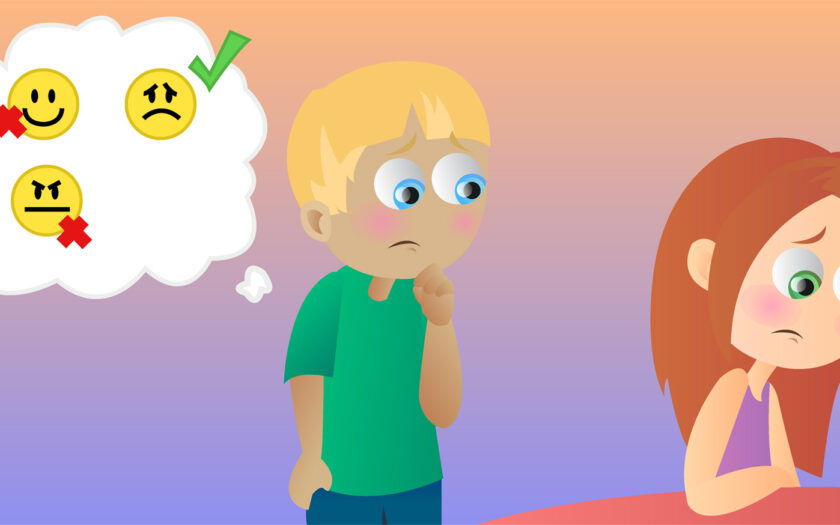Understanding and predicting other people’s feelings involves empathy and keen observation. By paying attention to both verbal and non-verbal cues—such as body language, facial expressions, tone of voice, and even silence—you can gain insights into how someone is feeling. Listening actively, asking open-ended questions, and showing genuine interest in their perspective helps you better understand their emotional state. Additionally, drawing on past experiences and recognizing patterns in behavior allows you to anticipate emotional responses. Developing this skill fosters stronger connections, improves communication, and helps you navigate social interactions with greater sensitivity and care.
Imagine this situation: a friend invites you to a party, and you find out that everyone in your group of friends is invited except Paula. How do you think Paula will feel if she finds out?
A. Angry
B. Sad
C. Hurt
D. Excluded
E. Confused
F. Nervous
G. Embarrassed
H. Indifferent
Most people would guess Paula might feel some combination of A, B, C, and D: angry, sad, hurt, or excluded. While feelings like confusion, nervousness, or embarrassment are possible, they’re less likely in this situation.
When you predict how someone might feel, you’re using emotional intelligence, often called EQ. This ability to understand other people’s emotions helps you navigate your interactions with them.
For example, if Paula asks, “Are you going to Regan’s party?” knowing she wasn’t invited might influence your response. Instead of answering carelessly, you might adjust your response to consider Paula’s feelings.
Reading Body Language
Sometimes, people give you information without speaking — through their body language and facial expressions. Emotional intelligence involves noticing these non-verbal cues.
Imagine Paula approaches you looking upset and asks, “Are you going to Regan’s party?” Her expression suggests she knows she wasn’t invited. In this case, you’d likely answer more thoughtfully, perhaps with empathy, rather than casually mentioning the party.
But if Paula asks the same question cheerfully, it might suggest she’s unaware of the situation and expecting an invite, so your response would change.
When you have good emotional intelligence, you likely feel conflicted about how to respond to Paula because you don’t want to hurt her feelings. You empathize with her, understanding that your response can either support her or make her feel worse.
Making Sense of Reactions
Emotional intelligence also helps you make sense of people’s reactions. Suppose a friend looks happy and energetic in the morning, but by afternoon seems upset and on the verge of tears. Based on emotional cues, you’d likely rule out explanations that don’t fit, like passing an exam (which would bring a positive reaction). Instead, you might guess your friend had a fight with their partner or received bad news.
Being skilled at understanding others allows you to predict their reactions and behaviors, which helps you connect more effectively.
Building This Skill
Predicting and understanding emotions takes practice, and while some people are naturally better at it, everyone can improve. The key is observing and listening.
It Starts With Watching
We naturally sense what others feel by watching them. Scientists believe this happens because of “mirror neurons,” brain cells that activate when we see someone else’s emotions or actions, as though we were experiencing them ourselves.
To strengthen your observation skills, try these tips:
- Watch body language and expressions. When you’re out in public, like at the mall or on the bus, observe how people carry themselves. Do they look stressed, confident, or relaxed? What might their expressions and posture say about their emotions?
- Read books or watch movies with realistic portrayals of human emotions. Pay attention to how characters feel and why they act the way they do. Predict their next moves or try to explain their behaviors based on their emotions.
It Improves With Listening
Understanding others isn’t just about watching — it’s also about listening. Research shows that people feel more connected to those who genuinely listen to them.
We often think we’re good listeners, but we can get distracted by our own thoughts and responses. Try these techniques to improve your listening skills:
- Practice active listening. During conversations, focus completely on the other person. Remind yourself that listening is more important than planning your next words.
- Tune into feelings as well as stories. When someone shares something with you, try to imagine how they felt. Respond with empathy, saying things like, “That must have felt amazing!” or, “That sounds really tough.”
- Take time for deep conversations. Interview a friend or family member about a special moment in their life. Ask about their feelings during that experience and listen deeply to their responses.
Turning Understanding Into Compassion
Once you’ve developed your skills in understanding others, the next step is using that knowledge to show compassion.
Try these ways to show compassion:
- Ask what others need. If someone is struggling, ask how you can help. Even if they don’t know, offering support shows you care.
- Show genuine interest in others. Ask people about their hobbies, feelings, or opinions. Be curious, not intrusive, and let them know you want to understand them better.
- Act with kindness. When you hear gossip or see someone being teased, imagine how the target feels. This can help you choose not to participate and instead offer kindness.
Even small acts of compassion, like sitting with someone who’s alone, can build strong social connections. These connections are crucial for our health, happiness, and well-being.



